In the 2010 report what we eat in America, the U.S government recommends 4700mg of potassium a day, but the report found less than 1% of women and less than 25% of men were eating the recommended daily amount.
The average daily intake was between 2600-2700mg a day.
To get close to the recommended daily amount the typical American would need to add at least 5 bananas to his daily diet, or maybe 4 sweet potatoes or 3 watermelons.
The bottom line is that’s a pretty big shortfall and the number one reason for the shortfall is lack of fruit and vegetables.
A lack of potassium was called a “public health concern” in the 2015 USDA Dietary Guidelines.
Because potassium is not just a mineral it is also an electrolyte that helps to regulate fluid levels.
It plays a major role in helping nerves and muscles communicate and it enhances the functioning of blood vessels, helping to manage sodium’s effects on blood pressure.
The American Heart Association. Says “When potassium intake is low and sodium intake is high, we actually increase our risk for high blood pressure”.
Published in the Journal of the American College of Cardiology. Data taken from 11 studies from 1966 to 2009 showed a 1,600mg per day higher potassium intake was associated with a 21% reduced risk of stroke.
You can check potassium levels with a basic blood test or you can look at your intake of greens. If your fruit and vegetable intake is low then you’re probably having less than the recommended amount.
But, the good news is you can easily add a little extra potassium to your diet…
The recommended daily allowance is 4700mg a day.
Here are 12 foods high in potassium you can add to your diet…
Avocado
 A 100gram serving of avocado has B1, B2, B3, B5, B6, B9 vitamins, vitamin K, vitamin C, vitamin E and 10% your daily intake of potassium.
A 100gram serving of avocado has B1, B2, B3, B5, B6, B9 vitamins, vitamin K, vitamin C, vitamin E and 10% your daily intake of potassium.
Avocados also have a range fats. The majority of an avocado’s energy comes from fat, most is monounsaturated.
Avocado oil is nutrient-rich and often used in salads, cooking and cosmetics products.
Spinach
 100 grams is just 23 calories and is jam packed with a huge amount of vitamin, minerals and antioxidants. You get 22% of your daily potassium and it’s also a great source of vitamins.
100 grams is just 23 calories and is jam packed with a huge amount of vitamin, minerals and antioxidants. You get 22% of your daily potassium and it’s also a great source of vitamins.
You get 59% of your daily requirement for vitamin A, 7% of DV B1, 16% of DV B2, 15% of DV for B6, 49% of B9, 34% of daily vitamin C and 460% of your daily vitamin K requirement, and it will also give you 22% of your daily magnesium, 21% of iron and 6% of your daily zinc intake.
Banana
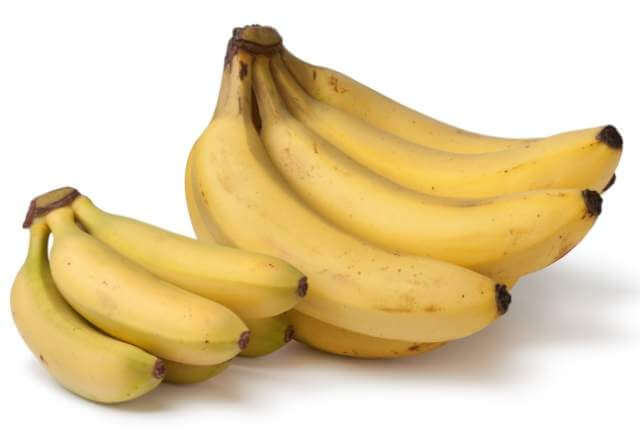 At a 100 gram serving you get 89 calories and 8% of your daily magnesium intake and 8% of your daily potassium intake. On top of that you’re also getting 31% of your daily vitamin B6 and 10% of your daily vitamin C and 7% of your daily B5.
At a 100 gram serving you get 89 calories and 8% of your daily magnesium intake and 8% of your daily potassium intake. On top of that you’re also getting 31% of your daily vitamin B6 and 10% of your daily vitamin C and 7% of your daily B5.
Sweet Potato
 100grams is 86 calories and 7% of your daily potassium intake. You also get 7% of your daily magnesium and 5% of your daily iron. There is a huge 89% of your daily vitamin A intake in 100grams of sweet potato, 16% of your B5 and 16% of your B6.
100grams is 86 calories and 7% of your daily potassium intake. You also get 7% of your daily magnesium and 5% of your daily iron. There is a huge 89% of your daily vitamin A intake in 100grams of sweet potato, 16% of your B5 and 16% of your B6.
Salmon
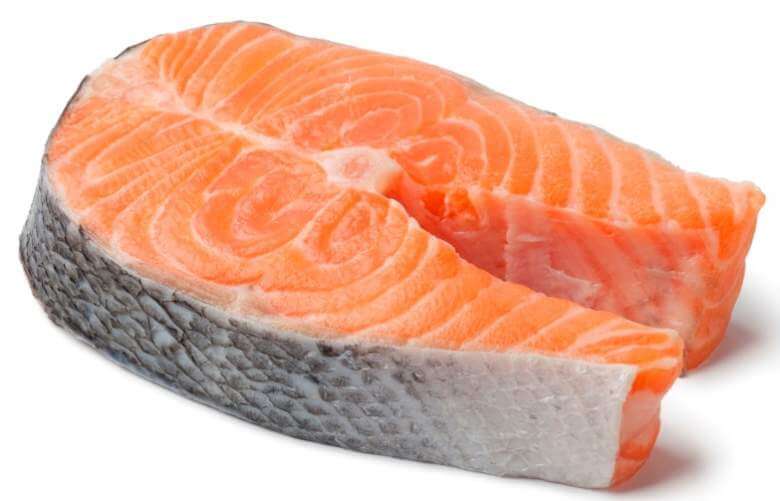 100 grams is 208 calories and 10% of your daily potassium intake. You’re getting 8% of your daily magnesium with a 100 grams serving and 6% of daily iron. There is also 20g of protein which is 40% of recommend daily intake and 52% of your daily intake for vitamin B3, 63% of your daily intake for B6 and 32% of your daily intake of B2.
100 grams is 208 calories and 10% of your daily potassium intake. You’re getting 8% of your daily magnesium with a 100 grams serving and 6% of daily iron. There is also 20g of protein which is 40% of recommend daily intake and 52% of your daily intake for vitamin B3, 63% of your daily intake for B6 and 32% of your daily intake of B2.
Mushrooms
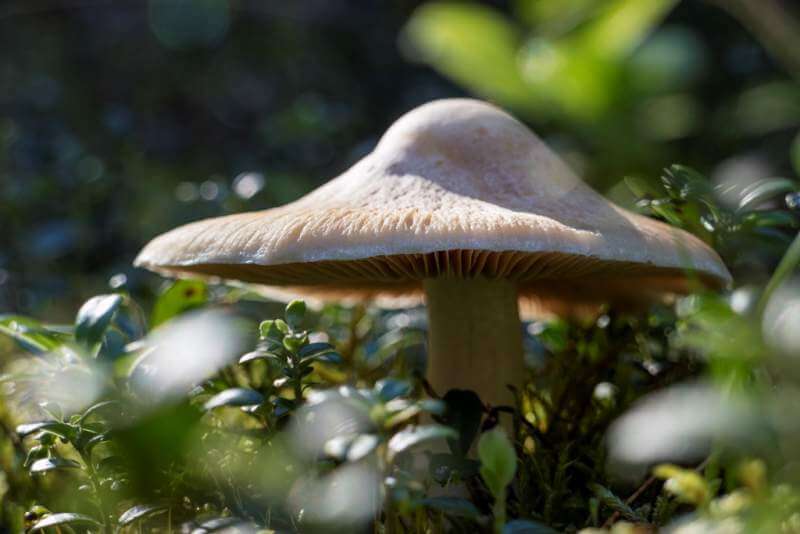 100 gram of mushrooms is only 22 calories and 10% of your daily potassium. Mushrooms have B vitamins like B2 42% of daily requirement, B3 25% of daily requirement and pantothenic acid otherwise known as B5 at 30% of your daily requirement.
100 gram of mushrooms is only 22 calories and 10% of your daily potassium. Mushrooms have B vitamins like B2 42% of daily requirement, B3 25% of daily requirement and pantothenic acid otherwise known as B5 at 30% of your daily requirement.
There is also 37% of your daily selenium requirement and 25% of your daily copper.
Dried Apricots
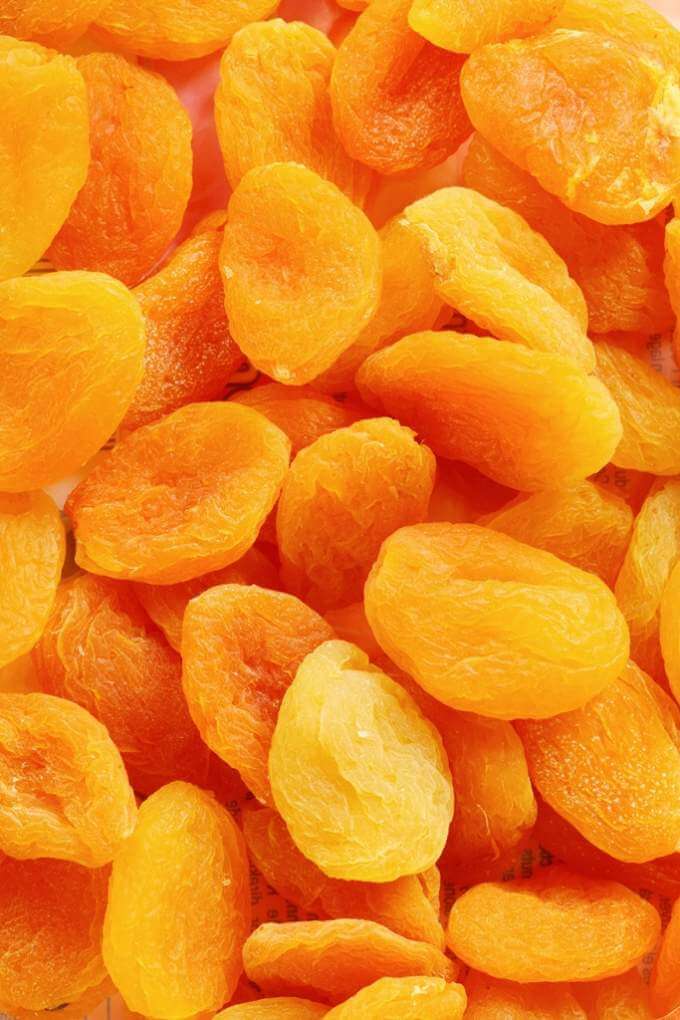 50 gram serving of apricots is 120 calories and 12% of your daily potassium. When you dry the apricots the nutrient concentration increases. In a 50 gram serving you get 10% of your daily iron, 14% of your daily vitamin E, 11% of your daily vitamin A and 8% of your daily vitamin B3.
50 gram serving of apricots is 120 calories and 12% of your daily potassium. When you dry the apricots the nutrient concentration increases. In a 50 gram serving you get 10% of your daily iron, 14% of your daily vitamin E, 11% of your daily vitamin A and 8% of your daily vitamin B3.
Sweet Corn
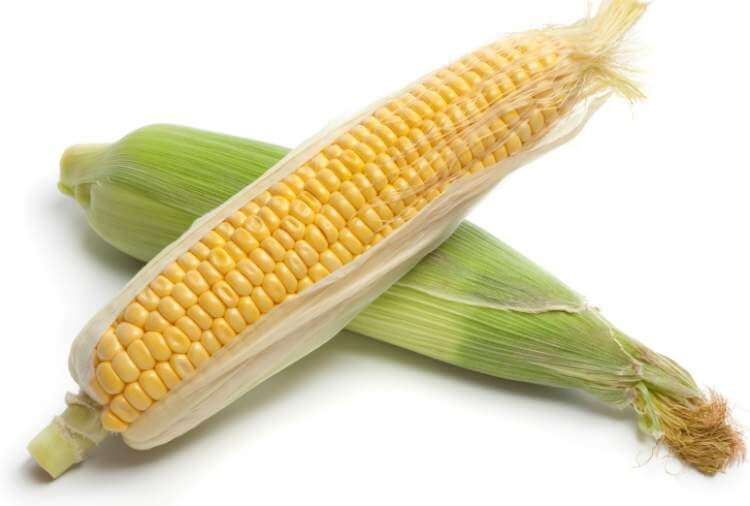 100gram serving is 86 calories and 6% of your daily potassium intake. You also get 17% of your daily B1, 12% of your daily B9, 11% of your daily B3 and 10% of your daily magnesium requirement.
100gram serving is 86 calories and 6% of your daily potassium intake. You also get 17% of your daily B1, 12% of your daily B9, 11% of your daily B3 and 10% of your daily magnesium requirement.
Coconut Water
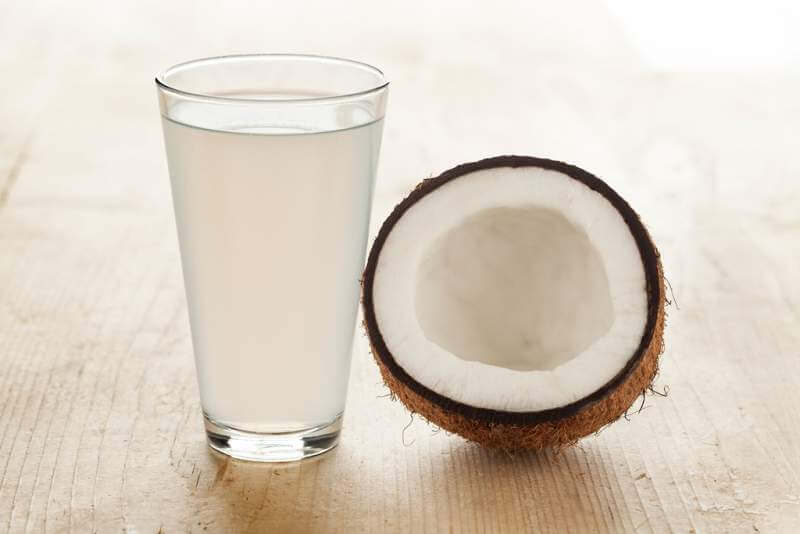 100 gram serving is just 19 calories and 5% of your daily potassium requirement. Coconut water is 95% water and 4% carbohydrates. Coconut water also has vitamins and minerals. So as well potassium you also get 7% of your daily magnesium, 5% of your vitamin B2 and 3% of your vitamin C requirement. The vitamin and mineral amounts might not sound like much, but coconut water delivers these minerals for only 19 calories.
100 gram serving is just 19 calories and 5% of your daily potassium requirement. Coconut water is 95% water and 4% carbohydrates. Coconut water also has vitamins and minerals. So as well potassium you also get 7% of your daily magnesium, 5% of your vitamin B2 and 3% of your vitamin C requirement. The vitamin and mineral amounts might not sound like much, but coconut water delivers these minerals for only 19 calories.
Asparagus
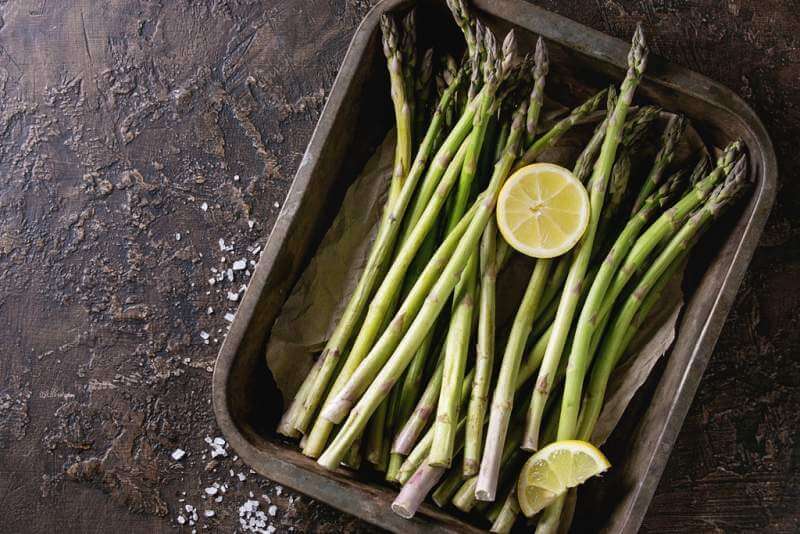 At a 100 gram serving, you get 20 calories and 16% of your daily iron intake and 4% of your daily potassium intake. Asparagus is 93% water, low in calories and very low in sodium.
At a 100 gram serving, you get 20 calories and 16% of your daily iron intake and 4% of your daily potassium intake. Asparagus is 93% water, low in calories and very low in sodium.
It’s also a good source of vitamins and minerals like calcium, magnesium, zinc, vitamin B, vitamin C, vitamin E, vitamin K and a good source of fiber, protein, beta-carotene and selenium.
Parsnips
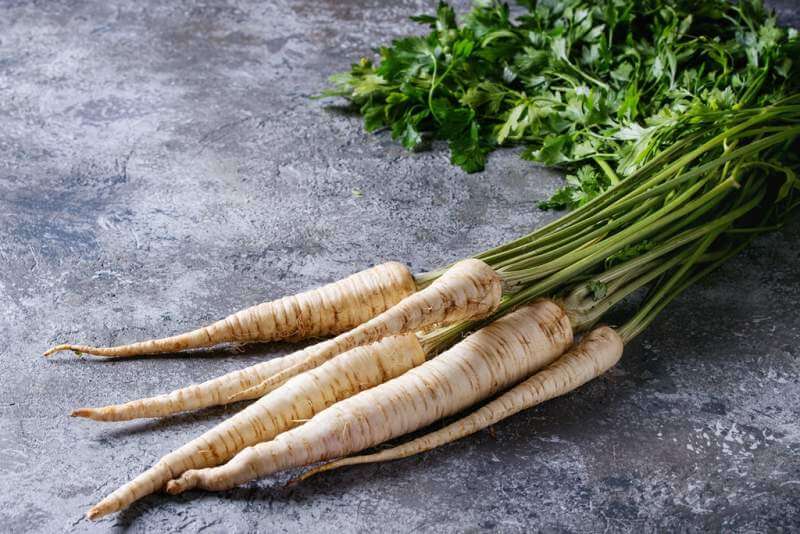 100 grams is 75 calories and most parsnips are around 80% water, 5% fiber, 5% sugar, 1% protein. A parsnip has vitamins and minerals and in particular has 375 mg per 100 g of potassium. 100grams would be 8% of your daily intake.
100 grams is 75 calories and most parsnips are around 80% water, 5% fiber, 5% sugar, 1% protein. A parsnip has vitamins and minerals and in particular has 375 mg per 100 g of potassium. 100grams would be 8% of your daily intake.
100grams will give you 20% of your daily vitamin C, 21% of your daily vitamin K, 17% of your vitamin B9 and 6% of your daily zinc.
Potato
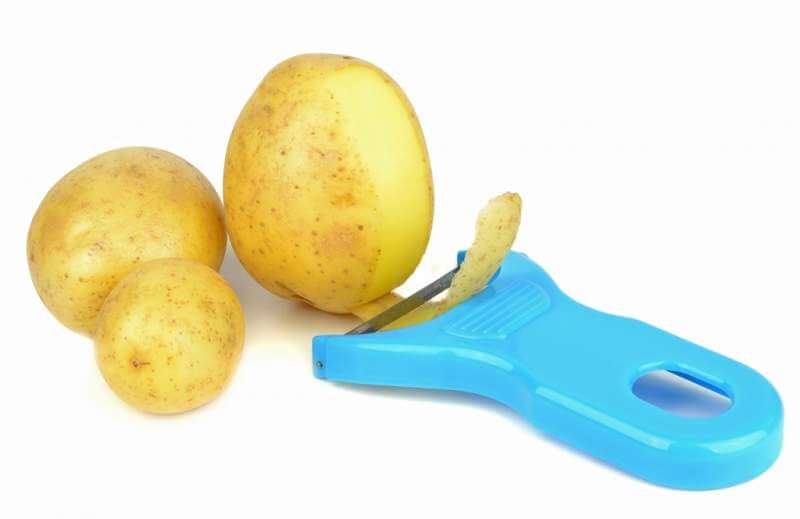 At a 100 gram serving, you get 77 calories and 6% of your daily iron intake and 9% of your daily potassium intake. You also get 23% of your daily vitamin B6, 24% of your daily vitamin C.
At a 100 gram serving, you get 77 calories and 6% of your daily iron intake and 9% of your daily potassium intake. You also get 23% of your daily vitamin B6, 24% of your daily vitamin C.
If you’re not eating enough greens it can be hard to get enough potassium through your diet, but these foods will help. If you can’t eat enough of these foods you can always use a supplement.
BIO:
CarlMarl writes for WhatDoesTestosteroneDo.org, Where he explains what does testosterone do to your sex drive… body fat… bone mass… brain… energy levels… muscle & immune function… and highlights natural approaches to low testosterone issues. He is passionate about health related topics and loves to walk outdoors.
